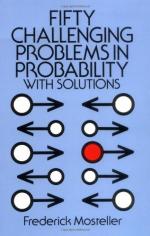|
This section contains 1,548 words (approx. 6 pages at 300 words per page) |

|
Probability measures the likelihood that something specific will occur. For example, a tossed coin has an equal chance, or probability, of landing with one side up ("heads") or the other ("tails"). If you drive without a seat belt, your probability of being injured in an accident is much higher than if you buckle up. Probability uses numbers to explain chance.
If something is absolutely going to happen, its probability of occurring is 1, or 100 percent. If something absolutely will not happen, its probability of occurring is 0, or 0 percent.
Probability is used as a tool in many areas of genetics. A clinical geneticist uses probability to determine the likelihood that a couple will have a baby with a specific genetic disease. A statistical geneticist uses probability to learn whether a disease is more common in one population than in another. A computational biologist uses probability to learn how a gene...
|
This section contains 1,548 words (approx. 6 pages at 300 words per page) |

|


